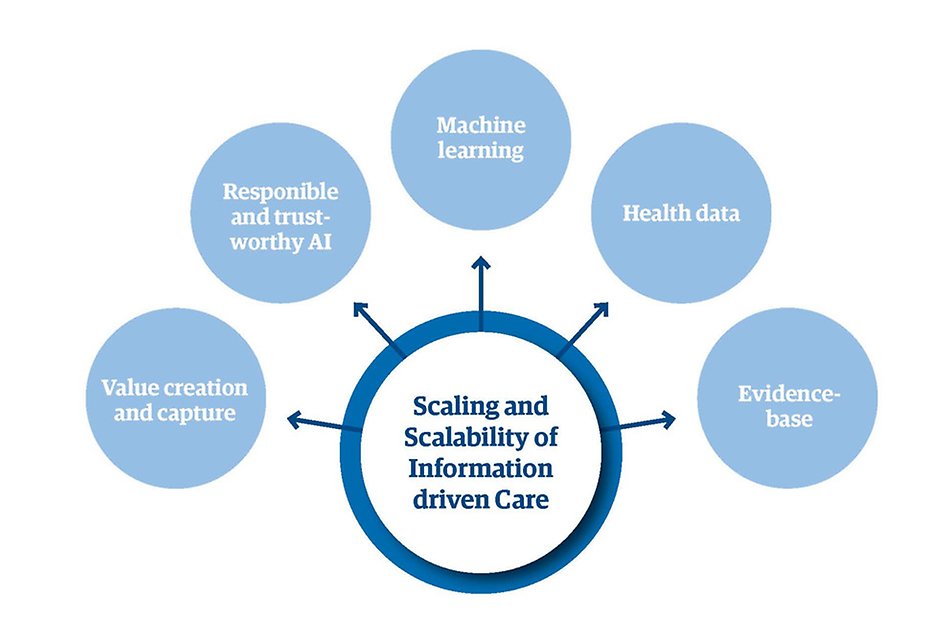IDC – Information Driven Care
Healthcare is facing extensive challenges – an aging population, various chronic diseases, pandemics, changing patient expectations and limited resources. Information driven care addresses some of these challenges through a shift towards more proactive, predictive, accurate, participatory, innovative and democratised healthcare.
.jpg)
The programme takes a broad approach to develop and research information driven care solutions, for example decision support systems in clinical practice. This will require building up knowledge about the whole healthcare innovation chain, from formulating and prioritizing questions, to data collection, to algorithms, to engagement, to explainability, to innovation, diffusion, and implementation in practice. The programme has a multidisciplinary approach and addresses challenges related to the complexity of developing information driven healthcare solutions, particularly in terms of AI systems, data, implementation and innovation challenges.
Personalized proactive care is one of two directions for the health innovation focus area. In this, implementation of information driven care constitutes a substantial part. This research program aims to continue developing this direction and contribute to the strategic goals of the focus area. This involves for example to position the research area nationally and internationally and to perform collaborative research that makes an impact in society. The research program will contribute to the goals set out in the focus area strategy.
IDC’s upcoming activities
Don’t miss out on what’s going on in IDC! Take part of upcoming activities here.
Research ambitions and research fields
The overall ambitions of the programme are:
- To further develop a multidisciplinary information driven care research environment, strengthening and integrating the disciplines of AI and machine learning, data infrastructure, implementation research and innovation science. A research environment which promotes career development in the field and provides equal opportunities to people of all genders and ethnicities.
- To further strengthen long-term collaborations and co-production with leading national and international universities, companies and public sector in the field of information driven care. A research environment which has an established model for how industry and public partners can collaborate to create and implement AI systems for sustainable adoption and diffusion as part of long-term efforts to improve healthcare and health outcomes.
- To continue developing a strong academic position (including research, education and collaboration) and add value to society. A research environment that addresses complex research questions from multi-disciplinary perspectives and provides excellent research and education that is practically useful and contributes to new understandings, knowledge and innovations. The research environment should be characterised by high specialisation in information driven care and high impact.
Three integrating research fields
AI and machine learning research
The AI and machine learning research is tightly connected to challenges of working with applications and data from healthcare. It involves pure algorithmic developments as well as specific solutions developed for a single application.
Implementation research
The research within healthcare implementation focuses on questions on how health innovations, such as interventions supported by digital services and health data, can be developed, implemented and evaluated to provide healthcare organizations with knowledge and support to achieve high quality of care and improved health outcomes for particular groups.
Innovation research
The research within innovation science is tightly connected to challenges working with healthcare innovation from the perspective of firms and healthcare organizations.
Ongoing projects
AI centered projects
- AIR Lund
- Dental GENI: Human-centered Generative AI for Guided Bone Regeneration in Dental Implants
- EDIH - Health Data Sweden
- HaRP – Heart failure Readmission Prediction
- IDC through AI Application External link.
- Improved preparedness for future pandemics
- PadAI – AI for better mental health in young people
- Prevention 360
- SAFE – Safe AI-assisted Fall Prevention through Evidence
- Test Bed Sweden for Precision Health in Cancer
Implementation projects
- Covid-19 – symptoms and immunity
- Digital anamnes and triage in primary care
- Framework development for AI implementation in healthcare
- ID Wound Care
- Implementation of information-driven healthcare through AI application
- AIM2
- Mental health in young adult cancer survivors
- SLEEP – Sleep intervention for children and adolescents with neuropsychiatric disabilities
- Social capital for identification and support of young people's mental health
- Understanding health innovation in practice
- UserInvolve: Developing sustainable user involvement practices in community mental health
- V3C – Value creating continence care (only in Swedish)
- Youth participation in healthcare
- Young people’s mental health, social capital and help-seeking behaviour
Innovation projects
- Approaches to evaluating implementation of health innovations
- Automatic Idea Detection: Implementing artificial intelligence in medical technology innovation (AID)
- BINECO – Business Models for Information-driven Healthcare Ecosystems
- ICHSI – Institutionellt entreprenörskap och utveckling i samverkan av företag i hälsosektorn på internationella marknader (only in Swedish)
- MeTARoad – Accelerating the roadmap for commercializing and adopting medical technology innovations – the role of different actors’ logics in a health innovation ecosystem
- Virtual Reality as a Distraction Method for Children During Medical Procedures
Participating researchers
School of Business, Innovation and Sustainability
- Magnus Holmén, Professor
- Jeaneth Johansson, Professor
- Svante Andersson, Professor
- James Barlow, Visiting Professor
- Fábio Gama, Senior Lecturer
- Hélène Laurell, Senior Lecturer
- Henrik Barth, Senior Lecturer
- Lina Lundgren, Senior Lecturer
- Ludvig Lindlöf, Senior Lecturer
- Rögnvaldur Saemundsson, Senior Lecturer
- Patrik Hidefjäll, Adjunct Senior Lecturer
- Anna Zukowicka-Surma, Postdoctoral Position
- Monireh Kashiha, Postdoctoral Position
- Muhammad Ismail, Postdoctoral Position
- Luís Irgang Dos Santos, PhD Student
- Manoella Ramos da Silva, PhD Student
- Hanna Daneshmir, PhD Student
- Ingela Mauritzon, PhD Student
- Alireza Esmaeilzadeh, PhD Student
- Nyasha Chifamba, PhD Student
School of Health and Welfare
- Jens Nygren, Professor
- Petra Svedberg, Professor
- Ingrid Larsson, Professor
- Per Nilsen, Professor
- Julie Reed, Visiting Professor
- Carl Macrae, Visiting Professor
- Thomas Plough, Visiting Professor
- Lena Petersson, Senior Lecturer
- Margit Neher, Assistant Professor
- Mikael Ahlborg, Senior Lecturer
- Katrin Häggström Westberg, Senior Lecturer
- Susann Arvidsson, Senior Lecturer
- Carina Göransson, Senior Lecturer
- Katarina Aili, Senior Lecturer
- Annelie Lindholm, Senior Lecturer
- Britt-Mari Gilljam, Senior Lecturer
- Daniel Tyskbo, Senior Lecturer
- Julia Malmborg Söderström, Associate Senior Lecturer
- Anna Gyberg, Postdoctoral Position
- Monica Nair, Postdoctoral Position
- Elin Siira, Postdoctoral Position
- Sara Karnehed, PhD Student
- Hassan Auf, PhD Student
- Emilie Steerling, PhD student
- Maria Lönn, PhD Student
- Daniel Daneshmir, PhD Student
- Britta Teleman, PhD student
- Marcus Rosenburg, Lecturer
- Caroline Karlsson, Project Assistant
- Hanna Johanson, Project Assistant
- Victoria Sandholm, Project Assistant
School of Information Technology
- Slawomir Nowaczyk, Professor
- Mattias Ohlsson, Professor
- Stefan Byttner, Professor
- Pontus Wärnestål, Deputy Professor
- Markus Lingman, Adjunct Professor
- Torkel Strömsten, Visiting Professor
- Philip Anderson, Visiting Professor
- Farzaneh Etminani, Senior Lecturer
- Jens Lundström, Senior Lecturer
- Katerina Cerna, Associate Senior Lecturer
- Prayag Tiwari, Senior Lecturer
- Najmeh Abiri, Senior Lecturer
- Amira Soliman, Associate Senior Lecturer
- Awais Ashfaq, Postdoctoral Position
- Atiye Hashemi, Postdoctoral Position
- Guojun Liang, Postdoctoral Position
- Alexander Galozy, Postdoctoral Position
- Ghada Fathey, Researcher
- Johannes Van Esch, Research Engineer
- Omar Hamed, Research Engineer
- Mirfarid Musavian Ghazani, Research Engineer
- Mohammad Mansoori, Research Engineer
- Ali Amirahmadi, PhD Student
- Emmanuella Budu, PhD Student
- Oskar Gustafsson, doktorand

News within IDC
Voices about IDC
Videos and podcasts
Youtube: 45 seconds with Monika Nair about implementation in healthcare External link.
Youtube: 45 seconds with Farzaneh Etminani about information driven care External link.
AI-podden with Farzaneh Etminani, Associate Professor at Halmstad University External link.
Other voices
Research Programme IDC at Vitalis and Medical Informatics Europe
Life Science Academy supports new companies in the health technology area
Contact
-
Professor and Research Programme Leader
-
Professor and Deputy Research Programme Leader

